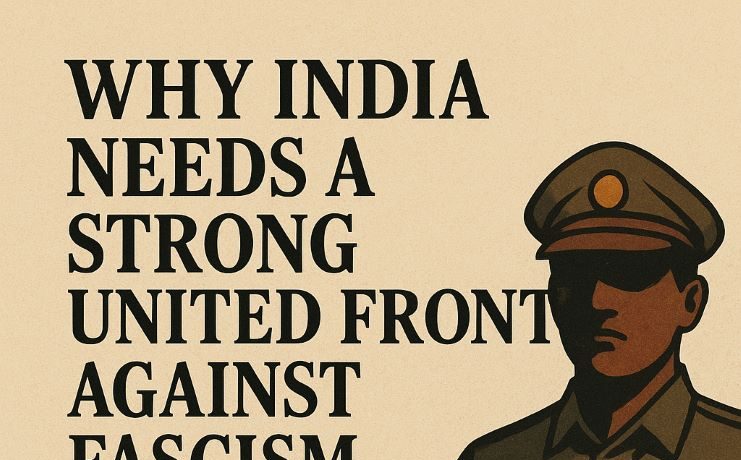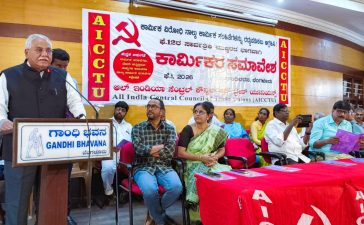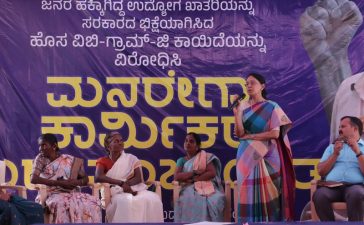Why India Needs a Strong United Front Against Fascism
An analytical report based on the thought-provoking QUESTIONS raised by Professor Shivsundar
✍️ Authored by Prof. Shivsundar
Powerful Introduction
In contemporary India, the rise of fascist forces has become a matter of growing concern. In his recent note, Prof. Shivsundar poses not statements but a series of hard-hitting, reflective questions. These are not merely academic queries—they resonate deeply with the future of India’s democracy, equality, and people’s movements.
This article attempts to capture the essence of those questions and translate them into a structured understanding of modern Indian fascism.
European Fascism and Its Indian Variant: Similarities and Differences
Prof. Shivsundar begins by asking whether Indian fascism bears similarities to the European fascism that arose amidst the chaos of two world wars in the 20th century.
His implication is clear: Indian fascism is not a carbon copy of European models but a local variant rooted in cultural, caste-based, and economic structures unique to India.
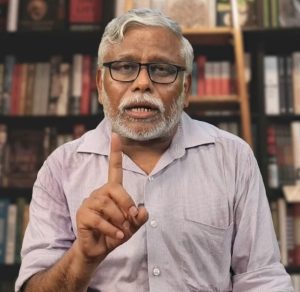
Is Fascism a Political Party or a Regime?
“This is not just about the BJP,” Shivsundar points out. Indian fascism may have found its roots in the Sangh Parivar, but it has spread into institutions of justice, education, media, and even the opposition.
He asks, “Is fascism merely a party, or is it a regime that has seeped into multiple constitutional and political institutions?“
Caste Hierarchies as the Social Foundation of Fascism?
Can the entrenched Brahminical caste hierarchy be seen as providing the socio-cultural basis for fascist nationalism and ethnic supremacy in India?
He argues: “Without caste, Indian fascism wouldn’t have found such a deep and lasting foundation.“
Economic Liberalization and the Rise of Corporate Fascism
The 1991 neoliberal economic reforms, land displacements in the name of development, and suppression of farmer protests—all contribute to what he terms economic fascism.
“From highways to high rises, the corporate state has bulldozed dissent and protected privilege,” he suggests.
Ideological Core: Hindutva + Neoliberalism + Corporate Power
Shivsundar identifies the core ideology of Indian fascism as a triad—Hindutva, Brahminism, and corporate capitalism.
He warns: “Such a doctrine cannot be defeated by electoral opposition alone—it demands a radical social movement led by the oppressed.“
Can the Opposition Truly Oppose Fascism?
What of the Congress and other opposition parties? Do they really stand against fascism, or have they become complicit in neoliberal Hindutva themselves?
He questions: “If the opposition shares the same economic and ideological foundations, can it genuinely challenge fascism?“
Electoral Tactics: Strategy or Surrender?
Is the growing tendency to treat elections as the sole method to defeat the BJP becoming a permanent strategy?
“If we pin all hopes on defeating fascism through elections alone—without grassroots mobilization—does that weaken the people’s movement?” he asks.
Have Elections Strengthened or Weakened the Anti-Fascist Front?
In the past decade, has the use of elections as a battlefield against fascism actually consolidated fascist forces socially? Or has it strengthened the anti-fascist camp?
This is not a rhetorical question but a real dilemma for progressive political strategy.
Unity of the Oppressed as the Foundation of Resistance
Can there be any meaningful anti-fascist movement without the unity of those most oppressed by the system—Dalits, Adivasis, Muslims, women, and the working class?
His answer is implicit: “Only a coalition rooted in justice and equality can challenge fascism at its core.“
Why Aren’t Strong Class-Based Movements Emerging?
Despite the need, why are strong, organized movements of the oppressed still missing in India’s political landscape?
He sees this as one of the most painful failures of our time.
Are Anti-Fascist Alliances Reduced to Symbolic Events?
Urban anti-fascist alliances have often been limited to annual rallies or symbolic protests.
“But beyond these events,” he asks, “why haven’t these coalitions evolved into sustained grassroots struggles or formed a coherent ideological alternative?”
No National Front Without Local Strength
Without strong grassroots organizations, is it even possible to build a powerful and effective anti-fascist front at the state or national level?
According to Shivsundar, “local strength is the backbone of national resistance.“
Can Fascism Be Defeated Through the Very System That Protects It?
If the Indian ruling class, its military, police, and judiciary have internalized fascism, can we really defeat fascism by relying on the state’s own institutions?
He challenges us to think: “Can the very establishment that shelters fascism be expected to destroy it?“
In Conclusion: Only a New Collective Awakening Can Prevail
In all these questions, Prof. Shivsundar argues that defeating fascism requires not just reactive politics but a radical reimagining of unity among the oppressed, a break from caste, class, and gender oppression, and a new ideological clarity.
A Painful Reflection, a Hopeful Appeal
“These questions are not mine alone,” he writes in his concluding note. “They are a reflection of our collective failure. But in our shared experiences of success and failure lies the wisdom to find some answers, some directions.”
👉 These are not just questions—they are intellectual sirens calling for a deeper struggle, a sharper strategy, and a stronger solidarity against the creeping shadow of Indian fascism.
This is not a note of despair. It is a call to organize.
🔹 Key Statements from the Story
-
“Indian fascism is not just a political party—it’s a regime that permeates institutions, opposition spaces, and everyday governance.”
-
“The caste hierarchy has long served as the silent foundation upon which Indian fascism builds its supremacist ideology.”
-
“Neoliberal economic reforms since 1991 have not merely opened markets—they have paved the road for corporate authoritarianism.”
-
“Opposing the BJP electorally without confronting Hindutva, Brahminism, and capitalism is a tactical detour—not a transformative strategy.”
-
“Without the unity of oppressed castes, classes, and minorities, any anti-fascist movement risks being symbolic rather than structural.”
🔹 Q&A
Q: Is Indian fascism a replica of European fascism?
A: No, while it draws inspiration from global authoritarian trends, Indian fascism is deeply local—rooted in caste, communalism, and cultural hegemony.
Q: Can Congress or other mainstream opposition parties be seen as true anti-fascist forces?
A: That’s questionable. When their economic and ideological stance mirrors neoliberal Hindutva, their opposition becomes performative rather than principled.
Q: What is the role of grassroots organizations in resisting fascism?
A: Crucial. Without decentralized, locally rooted movements, national-level coalitions are weak and often short-lived.
Q: Are symbolic rallies in cities enough to fight fascism?
A: No. Symbolic presence without sustained struggle at the ground level leads to spectacle, not change.
Q: Is it possible to defeat fascism through the very institutions that sustain it—like police, courts, and the military?
A: That’s the paradox. True resistance must come from outside these compromised structures, through people’s movements that challenge systemic power.
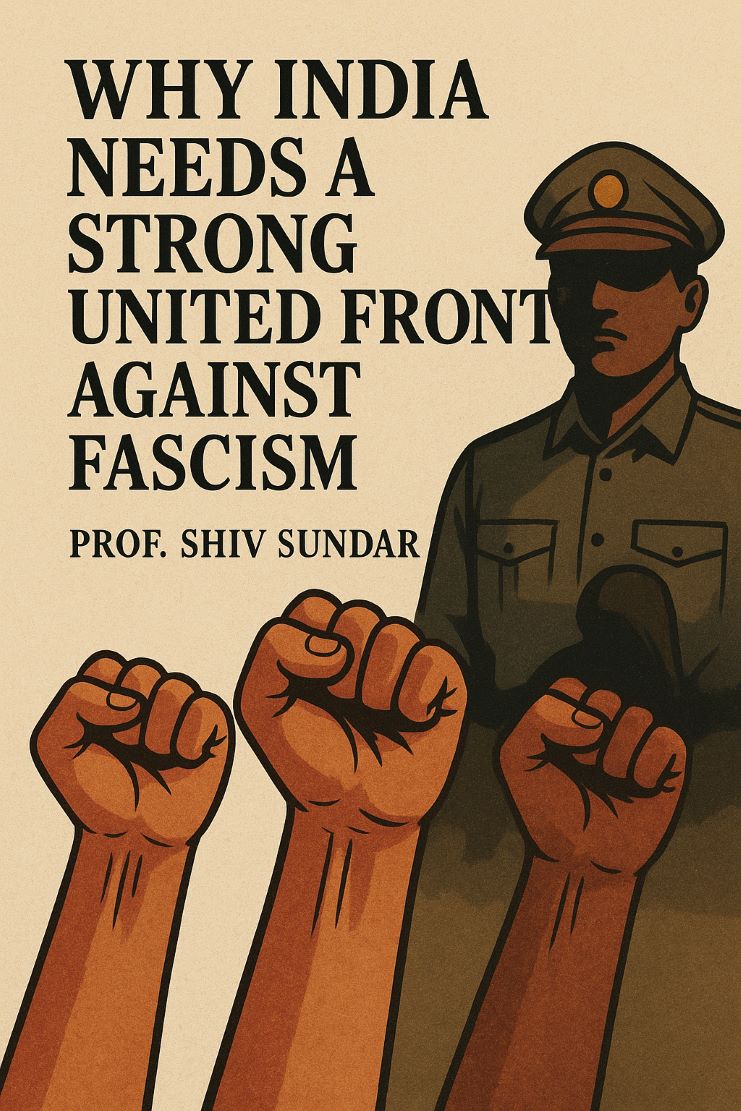
![]()

